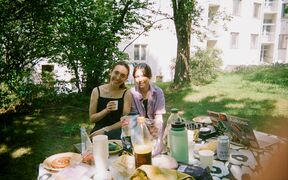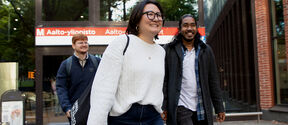Specialisations
The compulsory major courses taking place in the first year provide students with the main models, methods, and tools needed in software development and product and service design. Due to the small number of compulsory courses, students are free to select a set of courses to support their specific interests. A few course examples picked from the programme’s extensive curriculum are:
- Software Project (5–8 ECTS)
- Creative Digital Concept Design (4 ECTS)
- User Interface Construction (5 ECTS)
- Software Design and Modeling (5 ECTS)
- Software Testing and Quality Assurance (5 ECTS)
The major Software and Service Engineering programme embraces a student-centric approach to teaching. Although the major comprises two study tracks, students have the freedom to compose their own individual study plan based on their interests and aspirations. One-on-one tutoring sessions help students in compiling their personal study plan.
Students may choose to specialise in one of the two subfields listed below, or they can opt for a cross-disciplinary path that gives them a broad palette of skills. The two recommended subfields are:
Software Engineering
Software is what runs economies and organisations. In the Software Engineering track, students learn the processes, methods and techniques used in professional software development. Subjects covered include requirements engineering, design, implementation and testing, and deployment. Students can also participate in courses on project management, organisational development, and IPR.
Service Design and Engineering
Understanding customer and user needs is essential in digital service design. The core contents of the Service Design and Engineering (SDE) track include the conceptual and methodological basis for working with customers, users, and other stakeholders throughout digital service development. The user-centred and software-engineering methods support these joint design and evaluation activities.
Teaching methods
The teaching methods emphasise an industry-centric and interactive approach. Many of the individual assignments and group exercises introduce students to real-world problems which facilitates their development into critical and independent thinkers capable of applying knowledge from multiple disciplines. The questions that professionals in software and service engineering deal with often have important connections to human and societal well-being.
Since software engineering and service design are very collaborative fields, active peer learning is a defining characteristic of the programme. Group assignments embrace co-creation that can aim for innovative solutions in the field. Students develop their interpersonal skills, which prepares them for future work where teamwork, active listening and efficient communication are key.
Other learning methods include lectures by professors and visiting specialists, taking part in seminars, reading scientific articles, writing essays and deepening knowledge through personally tailored exercises. The aim is to provide students with a profound theoretical foundation but also prepare them to tackle practical day-to-day problems of contemporary society. The professor network includes internationally acclaimed and published specialists and researchers who are highly dedicated to their mission of educating future top professionals and co-creating an enjoyable learning environment together with the students.
More information on the programme content and curriculum can be found in the Student guide. There may be some changes to the courses for the academic years 2026–2028 — the new curricula will be published in April 2026, when they will also be visible in the Student guide.












